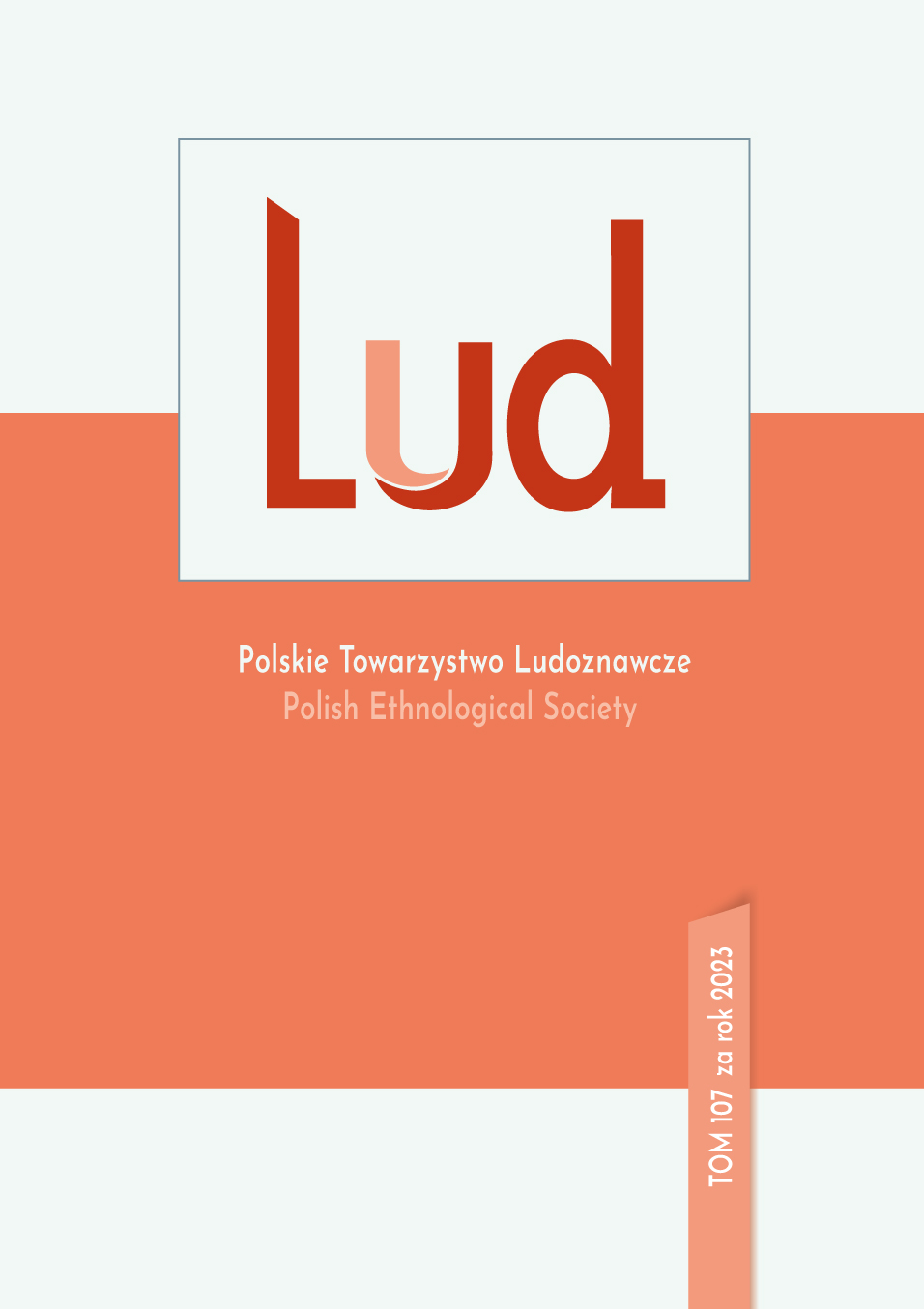Humor in time of plaque (Poland 2020-2022)
DOI:
https://doi.org/10.12775/lud107.2023.05Keywords
coronavirus, COVID-19, humor, laughter, pandemic, plagueAbstract
The article presents humor created in Poland during the COVID-19 pandemic from March 2020 to February 2022. Internet memes, social media statements, jokes and comical graphics present in public spaces were created by Poles in reaction to the events brought by the pandemic. Among the main topics of pandemic jokes were: making supplies, sitting at home, staying in quarantine, illegal gatherings, remote working and schooling, pandemic absurdities, symptoms of coronavirus infection, and vaccines. At the same time, there were taboo topics that were unlikely to be subject to jokes. The humor of the pandemic initially served a therapeutic and bonding function, but later turned into sarcasm and took on an aggressive tinge.
References
Al-Daher Zeyad, Al-Dala’ien, Othman Aref, Al-Shboul Yasser, Al-Rousan Mohammad, Sahawneh Meera B. 2022. COVID-19 Humor on Jordanian Social Media: A Diagnosis of Written Jokes on Facebook. „Eurasian Journal of Applied Linguistics” 8(1), pp. 149-161.
Amici Patrizia 2020. Humor in the age of COVID-19 lockdown: an explorative qualitative study. „Psychiatria Danubina”, Vol. 32, Suppl. 1, pp. 15-20. https://www.psychiatria-danubina.com/UserDocsImages/pdf/dnb_vol32_noSuppl%201/dnb_vol32_noSuppl%201_15.pdf [dostęp: 13.12.2022].
Aslan E. 2020. Days of our ‘quarantined’ lives: multimodal humour in COVID-19 internet memes. „Internet Pragmatics”. https://centaur.reading.ac.uk/100260/1/ASL.DOC_FINAL_proofed.pdf [dostęp: 13.12.2022].
Awierincew Siergiusz 1994. Bachtin, śmiech i kultura chrześcijańska. „Znak” 9 (wrzesień), s. 86-99.
Bachtin Michaił Michaiłowicz 1975. Twórczość Franciszka Rabelais’go a kultura ludowa średniowiecza i renesansu. Przeł. Anna i Andrzej Goreniowie, oprac., wstęp i weryfikacja przekładu Stanisław Balbus. Kraków: Wydawnictwo Literackie.
Bartzik Marek, Aust Fabienne and Peifer Corinna 2021. Negative effects of the COVID-19 pandemic on nurses can be buffered by a sense of humor and appreciation. „BMC Nursing” 20:257. https://bmcnurs.biomedcentral.com/counter/pdf/10.1186/s12912-021-00770-5.pdf [dostęp: 13.12.2022].
Bergson Henri 2000. Śmiech. Esej o komizmie. Przeł. Stanisław Cichowicz. Warszawa: Wydawnictwo KR.
Bischetti Luca, Canal Paolo and Bambini Valentina 2021. Funny but aversive: A largescale survey of the emotional response to Covid-19 humor in the Italian population during the lockdown. „Lingua”, 249, 102963. https://psyarxiv.com/efk93/ [dostęp: 13.12.2022].
Bystroń Jan Stanisław 1993. Komizm. Warszawa: Wydawnictwo „TEXT”.
Chłopicki Władysław, Brzozowska Dorota 2021. Sophisticated humor against COVID-19: the Polish case. „Humor” 34(2), s. 201-227. https://doi.org/10.1515/humor-2021-0015.
Chibuwe Albert and Munoriyarwa Allen 2022. Laughing through the Virus the Zimbabwean Way: WhatsApp Humor and the Twenty-one-day COVID-19 Lockdown. „African Studies Review”, Volume 0, Number 0, pp. 1–23. https://scholar.ufs.ac.za:8080/bitstream/handle/11660/11684/Chibuwe_Laughing_2022.pdf?sequence=1&isAllowed=y [dostęp: 13.12.2022].
Digital Humour in the COVID-19 Pandemic. Perspectives from the Global South 2021. Ed. by Shepherd Mpofu. Palgrave Macmillan Cham. https://link.springer.com/book/10.1007/978-3-030-79279-4#toc [dostęp: 13.12.2022].
El-Masry Menna Mohammed Salama 2021. Humor and Social Media: A Linguistic Analysis of Some Egyptian Coronavirus Memes. مجلة وادي النيل للدراسات والبحوث الإنسانية والاجتماعية والتربويه, vol. 30, issue 30, pp. 707-754. https://journals.ekb.eg/article_169855_c1048a131e04e700d9251b325bc941a3.pdf [dostęp: 13.12.2022].
Hadžić Jelena and Baralić Marina 2021. Humour in the Time of COVID-19 Pandemic. „In Medias Res”, Vol 10, br. 19, pp. 3069-3110. https://hrcak.srce.hr/file/381703 [dostęp: 13.12.2022].
Hodalska Magdalena 2020a. Internetowe żarty z pandemii koronawirusa w „zbiorowej pamięci zarazy”. „Kultura – Media – Teologia” 41, s. 7-37.
Hodalska Magdalena 2020b. Koronahumor jako forma komunikacji i „tarcza antydepresyjna”. Polskie internetowe żarty wirusowe. [W:] Od modernizacji do mediosfery: meandry transformacji w komunikowaniu: prace ofiarowane dr. hab. Ryszardowi Filasowi, [red.] Agnieszka Cieślikowa, Paweł Płaneta. Kraków: Instytut Dziennikarstwa, Mediów i Komunikacji Społecznej Uniwersystetu Jagiellońskiego, s. 339-364.
Kant Immanuel 2011. Krytyka władzy sądzenia. Przeł. Jerzy Gałecki. [W:] Bohdan Dziemidok, O komizmie. Od Arystotelesa do dzisiaj (antologię oprac. Monika Bokiniec). Gdańsk: Wydawnictwo słowo/obraz terytoria, s. 343-348.
Kazik 2020. Twój ból jest lepszy niż mój. https://www.youtube.com/watch?v=o9LzNtpjhV0 [dostęp: 30.05.2023].
Kuligowski Waldemar, UAMówi #3, Kwarantanna jako obrzęd przejścia. http://uamfilm.amu.edu.pl/UAMowi/prof.Waldemar_Kuligowski.pdf?fbclid=IwAR01w4YS7mXmUckFXIv9AZ-KOIvP4dsEOLekHdXZRHzQQiot5F4deWe04vU [dostęp: 30.11.2022].
Msimanga Mbongeni Jonny, Tshuma Lungile Augustine and Matsilele Trust 2022. The why of humour during a crisis: An exploration of COVID-19 memes in South Africa and Zimbabwe. „Journal of Arfican Media Studies”, Vol. 14, Issue Deadly Serious: Pandemic Humour, Media and Critical Perspectives, pp. 189-207. https://intellectdiscover.com/content/journals/10.1386/jams_00073_1 [dostęp: 13.12.2022]
Nicholls Christine 2020. Online Humour, Cartoons, Videos, Memes, Jokes and Laughter in the Epoch of the Coronavirus. „Text Matters” 10, s. 274-318. https://www.researchgate.net/publication/346453650_Online_Humour_Cartoons_Videos_Memes_Jokes_and_Laughter_in_the_Epoch_of_the_Coronavirus [dostęp: 13.12.2022].
Olah Andrew R. and Hempelmann Christian F. 2021. Humor in the age of coronavirus: a recapitulation and a call to action. „Humour” 34(2), pp. 329–338.
Plessner Helmuth, 2004. Śmiech i płacz. Badania nad granicami ludzkiego zachowania. Przeł. i oprac. Agata Zwolińska, Zbigniew Nerczuk, posł. Agata Zwolińska. Kęty: Wyd. ANTYK.
Reizer Abira, Munk Yifat, Frankfurter Lotem Katz 2022. Laughing all the way to the lockdown: On humor, optimism, and well-being during COVID-19. „Personality and Individual Differences”, Vol. 184, 111164.
Ridanpää Juha 2020. Crisis and Humorous Stories: Laughing at the Times of COVID-19. „Literary Geographies” 6(2), pp. 296-301. https://www.researchgate.net/publication/348236444_Crisis_and_Humorous_Stories_Laughing_at_the_Times_of_COVID-19 [dostęp: 13.12.2022].
Stefani Claudiu 2020. Humor During Pandemic in Romania on Facebook. „Culture e Studi del Sociale-CuSSoc” 5(1), Special issue, pp. 323-334. https://www.cussoc.it/journal/article/view/142/110 [dostęp: 13.12.2022].
Turner Victor 2010. Proces rytualny. Struktura i antystruktura. Przeł. Ewa Dżurak, wstępem opatrzyła Joanna Tokarska-Bakir. Warszawa: Państwowy Instytut Wydawniczy.
Żygulski Kazimierz 1976. Wspólnota śmiechu. Warszawa: Państwowy Instytut Wydawniczy.
Downloads
Published
How to Cite
Issue
Section
License
Copyright (c) 2023 Alicja Soćko-Mucha

This work is licensed under a Creative Commons Attribution-NoDerivatives 4.0 International License.
- The authors give the publisher (Polish Ethnological Society) non-exclusive license to use the work in the following fields:
- recording of a Work / subject of a related copyright;
- reproduction (multiplication) Work / subject of a related copyright in print and digital technique (ebook, audiobook);
- marketing of units of reproduced Work / subject of a related copyright;
- introduction of Work / object of related copyright to computer memory;
- dissemination of the work in an electronic version in the formula of open access under the Creative Commons license (CC BY - ND 3.0).
- The authors give the publisher the license free of charge.
- The use of the work by publisher in the above mentioned aspects is not limited in time, quantitatively nor territorially.
Stats
Number of views and downloads: 828
Number of citations: 0



